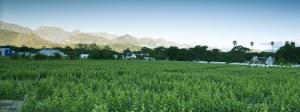Bottled wine consumption increased by 54% in South Africa and grows 10% per year.
The wine market in South Africa wakes up, especially red wine consumers. The growth of wine consumption around 10% in recent years. The number of consumers of bottled wine in South Africa can eclipse the brandy over the next three years, according to a recent report published by Business Intelligence Analytix, which highlights the growing number of consumers of red wine between 2007 and 2011, reflecting as the solid sector growth in the bottled wine has eclipsed that of the local spirits industry, which has stalled. According to the report, the bottled wine industry has experienced in recent years an increase of 54% from 2.1 million consumers in 2007 to 3.2 million consumers in 2011.
The number of consumers of bottled wine in South Africa can eclipse the brandy over the next three years, according to a recent report published by Business Intelligence Analytix, which highlights the growing number of consumers of red wine between 2007 and 2011, reflecting as the solid sector growth in the bottled wine has eclipsed that of the local spirits industry, which has stalled. According to the report, the bottled wine industry has experienced in recent years an increase of 54% from 2.1 million consumers in 2007 to 3.2 million consumers in 2011.
This means that the total population over 16 years in South Africa, 33,150,688 people, a 9.7% are consumers of bottled wines and three percentage points higher than five years ago.
Meanwhile, the percentage of consumers of brandy on the total consumer population potentially has fallen almost two points in that period, to assume 12%.
 With these data, wine consumption has grown at an annual rate of 10%, while the liquor industry lost 8% of consumers each year, from 4.3 million consumers in 2007 to just under 4 million in 2011.
With these data, wine consumption has grown at an annual rate of 10%, while the liquor industry lost 8% of consumers each year, from 4.3 million consumers in 2007 to just under 4 million in 2011.
At current rates, Analytix Business Intelligence BI, predicts that the number of consumers of bottled wine to consumers exceed brandy for the year 2014.
Some history:
The origins of wine in South Africa date back to the seventeenth century.Supplied to the ships of the Dutch East India Company who stopped in Cape Town for other parts of Africa, Asia and India, the pioneer Jan van Riebeeck decided to start growing grapes in Cape Town. Vines brought from Spain, France or Germany.
Seven years later began pressing the grapes from those vines from Spain, France and the banks of the Rhine Over 350 years of experience. South Africa was then a place of passage for Dutch ships, a strategic base where the tides of the Atlantic and Indian Oceans merged. The natural beauty of the Cape Peninsula has become a major destination.
The wine market in South Africa wakes up, especially red wine consumers. The growth of wine consumption around 10% in recent years.
 The number of consumers of bottled wine in South Africa can eclipse the brandy over the next three years, according to a recent report published by Business Intelligence Analytix, which highlights the growing number of consumers of red wine between 2007 and 2011, reflecting as the solid sector growth in the bottled wine has eclipsed that of the local spirits industry, which has stalled. According to the report, the bottled wine industry has experienced in recent years an increase of 54% from 2.1 million consumers in 2007 to 3.2 million consumers in 2011.
The number of consumers of bottled wine in South Africa can eclipse the brandy over the next three years, according to a recent report published by Business Intelligence Analytix, which highlights the growing number of consumers of red wine between 2007 and 2011, reflecting as the solid sector growth in the bottled wine has eclipsed that of the local spirits industry, which has stalled. According to the report, the bottled wine industry has experienced in recent years an increase of 54% from 2.1 million consumers in 2007 to 3.2 million consumers in 2011.This means that the total population over 16 years in South Africa, 33,150,688 people, a 9.7% are consumers of bottled wines and three percentage points higher than five years ago.
Meanwhile, the percentage of consumers of brandy on the total consumer population potentially has fallen almost two points in that period, to assume 12%.
 With these data, wine consumption has grown at an annual rate of 10%, while the liquor industry lost 8% of consumers each year, from 4.3 million consumers in 2007 to just under 4 million in 2011.
With these data, wine consumption has grown at an annual rate of 10%, while the liquor industry lost 8% of consumers each year, from 4.3 million consumers in 2007 to just under 4 million in 2011.At current rates, Analytix Business Intelligence BI, predicts that the number of consumers of bottled wine to consumers exceed brandy for the year 2014.
Some history:
The origins of wine in South Africa date back to the seventeenth century.Supplied to the ships of the Dutch East India Company who stopped in Cape Town for other parts of Africa, Asia and India, the pioneer Jan van Riebeeck decided to start growing grapes in Cape Town. Vines brought from Spain, France or Germany.
Seven years later began pressing the grapes from those vines from Spain, France and the banks of the Rhine Over 350 years of experience. South Africa was then a place of passage for Dutch ships, a strategic base where the tides of the Atlantic and Indian Oceans merged. The natural beauty of the Cape Peninsula has become a major destination.




